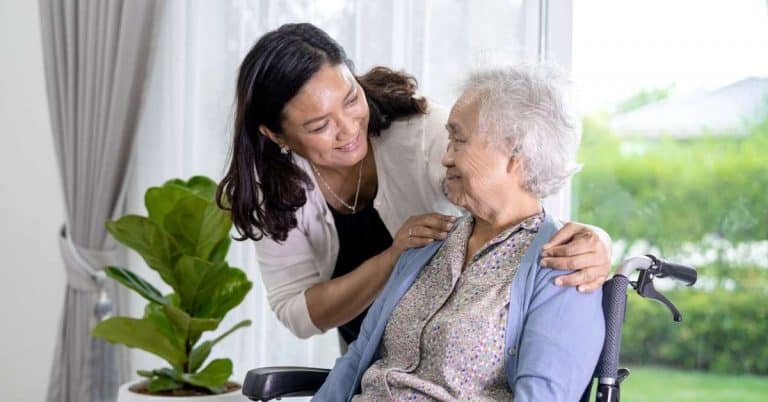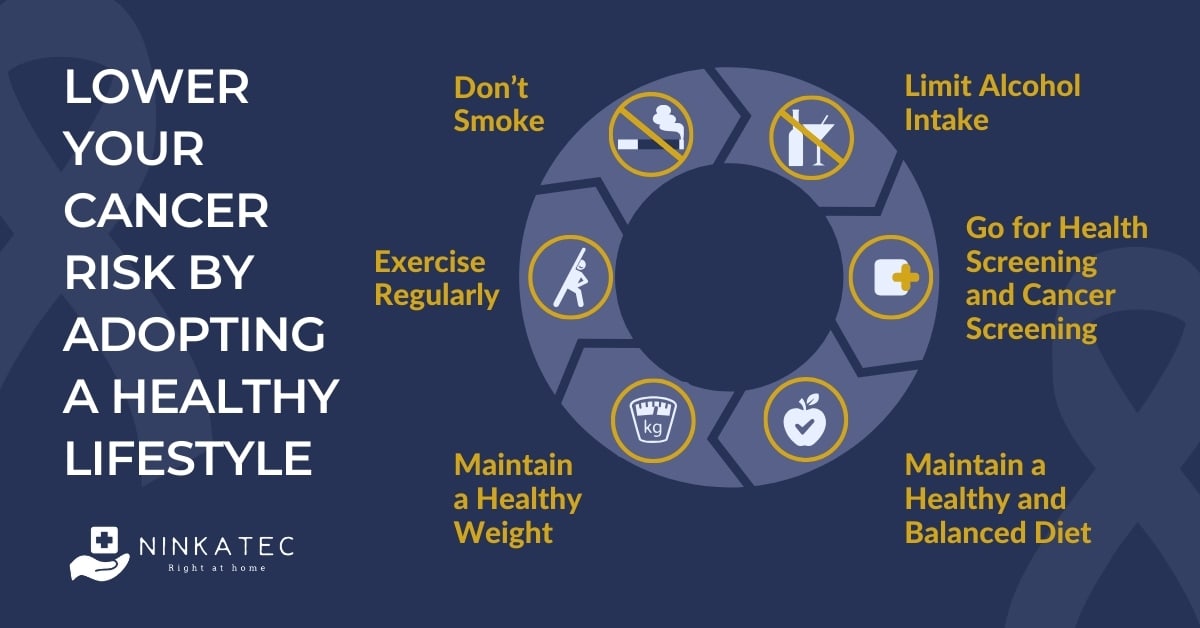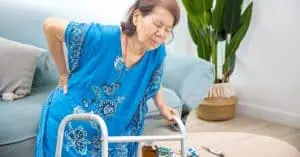Table of Contents
Latest Singapore Cancer Report: Prostate Cancer Most Prevalent for Men, Breast Cancer for Women
According to the latest Singapore Cancer Registry Report, between 2017 and 2021, 46 people were diagnosed with cancer daily in Singapore. During the same period, 16 people died from the cancer every day in our island nation, marking cancer as the top cause of death, responsible for 28.2% of all deaths.
For men in Singapore, prostate cancer was the most prevalent, while lung cancer was the most deadly. For women, breast cancer remained the most diagnosed and also the leading cause of cancer-related deaths.
Despite these sobering statistics, there is a silver lining: mortality rates have seen a decline, thanks in part to better awareness and early detection strategies that facilitate earlier and more effective treatment. This underscores the critical role of awareness and vigilance in the fight against cancer, something we all can take an active part in, not just to protect ourselves but also our loved ones.
We spoke with esteemed Medical Oncologist Dr. Donald Poon to have our top 10 questions about cancer answered. In his practice, Dr. Poon manages all kinds of tumours, with a special interest in geriatric oncology (cancer among the elderly). His extensive experience offers invaluable insights into crucial aspects of cancer care, from the importance of timely diagnosis, to prevention and the latest in cancer treatments. Join us for the insightful interview.
1. What are the causes of cancer?
The underlying cause of cancer is genetic change. All cells have an orderly growth pattern and regression pattern. Cancer happens when this pattern is disrupted due to lifestyle habits such as poor dietary patterns, high consumption of alcohol, or exposure to environmental factors such as air pollution, or viral infections. For example, Hepatitis B is associated with a more than 100 times increase in liver cancer. Epstein-Barr virus, also known as EBV virus, is associated with several lymphomas and nasopharyngeal cancer in South East Asia. Radiation can also cause genetic damage or DNA damage, which is a commonly known cause of cancer.
2. What about genetic causes? Is cancer more genetic or environmental?
Research has shown that 90-95% of cancer cases are due to environmental and lifestyle factors. Only a small group of 5-10% of cancer patients inherit cancer genetic susceptibility. In these cases, the genes that they inherit have specific changes that predispose them to a particular type or several types of cancer after they are born. The good news is that we can identify them through family history based on the person who first discovered this family cancer syndrome. The most common example would be hereditary nonpolyposis colorectal cancer (HNPCC) or Lynch syndrome. Other common family cancer syndromes are breast cancer, ovarian cancer, uterus cancer, and colorectal cancer. Less common forms of hereditary cancer include stomach cancer, kidney cancer, and prostate cancer.
3. What are the common symptoms of cancer?
Different types of cancer show various symptoms. I will talk about symptoms of the three most common cancers in Singapore: colorectal cancer, breast cancer, and lung cancer.
For colorectal cancer, the frequent symptoms would be a change of bowel habits like sudden constipation, inability to pass motion, blood in stools, spurious diarrhoea, and abdominal pain, weight loss, and loss of appetite.
For breast cancer, which is the most common type of cancer among women in Singapore, patients would first notice a breast lump. Fortunately, breast cancer can be detected early nowadays thanks to the advent of breast cancer screening technology such as mammograms and breast ultrasounds.
For lung cancer, the next top cancer type in Singapore, unfortunately, there are only a few early signs and symptoms. Early lung cancer screening is not highly effective. Consequently, lung cancer is often diagnosed in its advanced stage. The good news is lung cancer rate has declined in Singapore with the decreased smoking rate. Smoking is one of the causes of genetic change or DNA damage in the lungs, airways, mouth, tongue, and even the oesophagus due to swallowing of cigarette smoke sediments.
4. Apart from lung cancer, which is hard to detect early, are there other reasons through which some patients only find out about cancer when it has progressed to an advanced stage?
Many types of cancer are insidious, and the symptoms they cause are attributed to such common causes that early symptoms can be easily missed. Irritable bowel syndrome in the case of colon cancer is an example. Another example is nasopharyngeal carcinoma (or NPC), of which symptoms can be as common as having a blocked nose. Naturally, no one with a blocked nose would think they have cancer. So they may consult a family physician and be treated for rhinitis, sinusitis, upper respiratory tract infection before finally being diagnosed with cancer, which may be at least several months down the road.
5. How do doctors diagnose the different stages of cancer? At which stage will cancer start to be critical?
If the cancer is confined to the primary organ that it started out from, cancer is in Stage 1 or 2, depending on the size. If it has spread to the lymph nodes, it is usually diagnosed as Stage 3. If it extends beyond the regional lymph nodes, it is Stage 4.
Different cancer at different stage has a different prognosis. Stage 4 doesn't always mean incurable. For example, an aggressive high-grade lymphoma diagnosed in Stage 4 is routinely curable nowadays with antibodies, chemotherapy, and targeted therapies. On the other hand, common cancers like colorectal cancer, breast cancer, and lung cancer would not be curable and therefore critical when diagnosed in a Stage 4 setting. Palliative care can be considered to control cancer and prolong survival. For some instances of Stage 4, like colorectal cancer or lung cancer, it is still curable if the spread is just confined to the liver or lung with 1 or 2 tumours. Those tumours can still be removed with adjuvant treatment like chemotherapy and targeted therapy. A good 30% can even be cured despite being diagnosed in Stage 4.
6. Does age affect cancer prognosis and treatment plan?
Age influences cancer prognosis and cancer treatment decisions. Cancer incidents exponentially increase after 50 years old. Age also affects the ability to tolerate treatment, especially for decreased body reserves like kidney function, liver function, and heart function, leading to compromised cure rates. Nonetheless, the converse is also true. Cancers in younger cancer patients tend to be more aggressive, partly because they may have a genetic susceptibility. In these cases, there is little we can do to reverse the genetic change inherited, and cancer may progress despite all the best efforts to prevent it.
7. How should cancer patients manage their day-to-day routine during cancer treatment?
It depends on the type of cancer and the cancer treatment they are receiving. Here are a few general recommendations.
Good oral hygiene is essential to avoid infection from the mouth spreading to the rest of the body. Cancer doctors often recommend going for a dental clearance before starting treatment. This is done in order to prevent the risk of delaying the doses, treatment and compromising the outcome as a result of tooth decay.
Another general piece of advice is to avoid raw food to prevent contamination of the gut. There is a risk of immunocompromised opportunistic infection rising in the immunocompromised host, especially from the bowel. Also, cancer patients are often recommended to avoid crowded places, get sufficient rest with 8 hours of sleep, and exercise moderately during their treatment.
8. What are the future changes we can expect from cancer treatment?
Cancer treatments in Singapore and worldwide have drastically improved. Patients can expect fewer side effects from cancer treatment, experience more convenient methods of administering chemotherapy, and new therapeutics classes.
Hair loss, nausea, and vomiting are becoming less and less common during chemotherapy treatment. Many chemotherapy agents, particularly those used to reduce the risk of relapse after colorectal surgery, do not cause hair loss. Effective anti-nausea and vomiting medications are available to prevent these side effects before, during, and after chemotherapy. Other side effects such as mouth ulcers and diarrhoea are actually quite specific to what chemotherapy agents are given. And it is no longer true that chemotherapy has to be given intravenously. Many chemotherapy agents are now taken orally, which is much more convenient for patients.
I also expect more progress in new ways to treat cancers, especially with targeted therapy and immunotherapy, which focuses on fixing cancerous cells' workings. They have their specific set of side effects, which are different from chemotherapy. Patients need to speak with their oncologist in detail if they are considering one of them.
9. Is cancer preventable?
As discussed above, 90-95% of cancer cases are due to environmental and lifestyle factors. Therefore, cancer is largely preventable. If everyone stops smoking in the world from this moment, there will be a significant reduction in lung cancer rate almost instantly. Also, limit or reduce to the minimum consumption of processed food such as salted egg, salted vegetable, processed meat, canned food, and those labeled by the World Health Organization as Level 1 carcinogen. Aside from prevention, individuals with certain risk factors such as age are also recommended to go for periodic cancer screening to make earlier diagnoses so that cancer treatment can be more effective.
10. What is your advice for Singaporeans regarding cancer screening?
Statistics has shown that early detection improves cancer treatment outcome. Singaporeans are recommended to take part in Screen for Life - the national program for cancer screening. Screening for high risk cancers such as colorectal cancer (for both men and women) breast cancer and cervical cancer (for women) are available at subsidised price at all CHAS clinics.
Individuals of 50 years old and above can screen for colorectal cancer for free, using a Faecal Immunochemical Test (FIT) kit endorsed by the Singapore Cancer Society in conjunction with Singapore Health Promotion Board. You can obtain the test kits for free from the Singapore Cancer Society or many collection points; follow the instructions to collect test material and mail it back in a self-addressed envelope. Results will be informed to you accordingly.
For breast cancer, we usually advocate having a mammogram or ultrasound screening after 40 years old. For smokers or ex-smokers, they can consider low-dose CT scan screening of the lungs to detect early lung cancer as X-rays are usually not that useful in picking up early-stage cancers.
Fortunately, we have adjuvant treatment nowadays that would reduce the risks of recurrence by as much as 30% to 50%. Cancer recurrence rates have declined, be it from breast cancer surgery, colorectal surgery, or lung cancer surgery. These three common forms of cancer all have adjuvant treatment programs to prevent recurrence, which most people in their late Stage 2 or Stage 3 would be encouraged to go for.
Thank you for your invaluable sharing, Dr. Donald Poon!
Ninkatec's Services for Cancer Care At Home
Ninkatec is one of Singapore's leading home care service providers, offering cost-efficient care solutions empowered by medical technology for a wide range of conditions such as cancer care, dementia care, stroke care and elderly care.
We provide different home care plans for cancer patients depending on the medical conditions and needs of our customers. After an assessment by a Ninkatec doctor, you will be recommended with a best-suited home care solution for your situation.
We offer the following home care services for cancer patients:
- Hospital @ Home - Intensive home care service for cancer patients in critical stages such as post-surgery recovery, and post-discharge transitional care, and for patients in need of daily palliative and medical care.
- Palliative Care for Cancer Patients Recuperating from Home - Our palliative care team work together with your primary oncologist to provide the medical support you need to deal with side effects, improve mobility and nutrition, and recover faster. Learn more about how palliative care can benefit you or a loved one from our blog articles.
- House Doctor, House Nurse, Caregivers - Call on our team of experienced doctors, nurses and caregivers to address the multi-faceted medical need you may have, right in the comfort of you own home.
Recover at Home With Ninkatec
The journey to recover from cancer often takes more than medical intervention. Support from family and friends, sufficient rest and comfort for the body to heal play an important role. Ninkatec medical and care team understand the challenge and develop cancer care solutions to help you recover comfortably at home during cancer treatment. With Ninkatec, you can rest assured you are under 24/7 top-quality professional care, right in the comfort of your home.
Get Screened for Cancer - Take the First Step Towards Health
Our sister GP clinic - Charazoi Medical Clinic - provides cancer screening with subsidy under Screen for Life program. We also offer cutting edge multi-cancer early detection using a blood test for individuals with elevated cancer risk such as having family history of cancer, alongside with a regular health screening package and strictly with doctor’s consultation. Early detection can save lives. Early treatment increases the rate of successful treatment. Visit Charazoi website or chat with us below to learn more.











